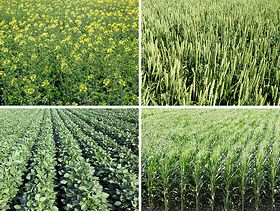 e UK some uncertainty remains over winter kill and final 2012/13 rapeseed area. Sowing for 2014 harvest has been in good conditions. It's confirmed that seed sales have been lower, but more farm-saved seeds may have been used.
e UK some uncertainty remains over winter kill and final 2012/13 rapeseed area. Sowing for 2014 harvest has been in good conditions. It's confirmed that seed sales have been lower, but more farm-saved seeds may have been used.The UK's wheat harvest was generally much better than feared; with good yield and quality, but production down. What winter barley was planted has performed well. There were much larger spring barley plantings, around 4m tonnes. Oats performed well, more plantings. Planting for 2014 going well across all crops.
In Germany production is 11 per cent above the five-year average (including a 12 per cent increase in plantings).
Farmers have returned to rapeseed, especially in the North. A combination of neonicotinoids and biofuel demand are discouraging rapeseed production.
This year has proved difficult for rapeseed in France, with production down by 20 per cent.
Soft wheat yields were just above the five-year average, with quality crops in the North, and less in the South.
May rainfall was a record, with 40 per cent of maize sown two months late in one region. However this was followed by drought in July. Yields will be lower – around 15 Mt with imports to EU from Ukraine.
EU summary
Harvest will total 20mt of oilseeds, mainly the result of good eastern European crops this year.
Protein crops are suffering, but conditions in 2013 did encourage more spring planting to replace failed areas of winter crops.
Technical issues with neonicotinoids and biofuel policy is leading to less security in markets.
Global markets
South Americans are still sowing their soya crops. Rapeseed globally is at 66mt, a record year, rainfall in Ukraine is disrupting harvest, but 39mt global sunflower crop likely.
The EU is a net exporter of rapeseed and soya oil for the first time since 2008.
Claims that EU uses too much rapeseed oil are therefore unfounded. Germany is exporting 1 milion tonnes (traditionally 590k tonnes) with some going to Asia, Norway and France.
World markets are developing. Oilseed crushes for soya are being developed in Brazil may change dynamics again.





